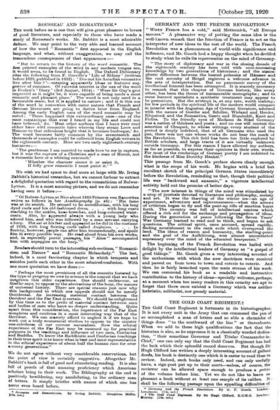GERMANY AND THE FRENCH REVOLUTION.* "Wuxi.; France has a cold,"
said Metternich, "all Europe sneezes." A pleasanter way of putting the same idea is the well-known remark that the function of France is to act as the interpreter of new ideas to the rest of the world. The French Revolution was a phenomenon of world-wide significance and influence, and Mr. Gooch had a happy thought when he decided to study what he calls its repercussion on the mind of Germany.
" The story of diplomacy and war in the closing decade of the eighteenth century has been told with ever-increasing knowledge by two generations of historians ; and the atmos- pheric difference between the heated polemics of Heuseer and the cool serenity of Heigel registers a welcome advance in the arts of interpretation. But no panoramic survey of the intellectual ferment has been attempted. It is scarcely necessary to remark that this chapter of German history, like every other, has been the theme of innumerable monographs ; and to some learned specialists a synthetic treatment may appear to be premature. But the attempt is, at any rate, worth making ; for few periods in the spiritual life of the modern world compare in interest with the Augustan Age of German literature, adorned with the names of Goethe and Schiller, Wieland and Herder, Klopstoek and the Romantics, Gent. and Humboldt, Kant and Fichte. To the friendly eyes of Madame de Steel Germany was a nation of thinkers and poets ; and no one will contest the assertion of Chuquet, to whose writings every student of the period is deeply indebted, that of all Germans who used the pen, there was not one whose works do not bear the mark of the Revolution. This rich field has been too little explored by British scholars, and large tracts of it are virtually unknown outside Germany. For this reason I have allowed my authors, as far as possible, to express their opinions in their own words. For most of the renderings of German poetry I run indebted to the kindness of Miss Dorothy Henkel."
This passage from Mr. Gooch's preface shows clearly enough what is the scope of his work. He begins with a brief but
excellent sketch of the principal German States immediately before the Revolution, reminding us that, though their political life was " backward and anaemic," a vigorous intellectual activity held out the promise of better days.
" The new interest in things of the mind was stimulated by a Drop of journals devoted to literature and philosophy, society and art. It was the thawing of the winter ice—an age of experiment, adventure and rejuvenescence—when the arrows of criticism began to fly and the pent-up rills of emotion buret forth. The country was full of intellectual centres which offered a rich soil for the exchange and propagation of ideas. During the generation of peace following the Seven Years' War Germany learned to read and to think, and began to ask questions. The critical spirit, once aroused, spread rapidly, finding nourishment in the rank evils which overspread the land. The ideas of reason and humanity, the starting-point and the goal of the Aufklarung, won almost uncontested supremacy over the mind of the educated bourgeoisie."
The beginning of the French Revolution was hailed with delight by the intellectual leaders of Germany as " a gospel of good tidings." Mr. Gooch gives a very interesting account of the enthusiasm with which the new doctrines were received and passed on from town to town and coterie to coterie. And then he is fairly launched upon the main stream of his work.
We can commend his book as a readable and instructive contribution to the history of ideas—specially welcome, perhaps,
at a moment when too many readers in this country are apt to forget that there once existed a Germany which was neither hubristic, militarist, nor grossly material.


































 Previous page
Previous page